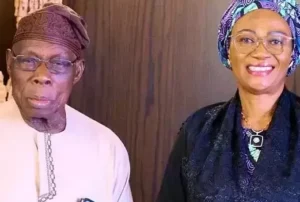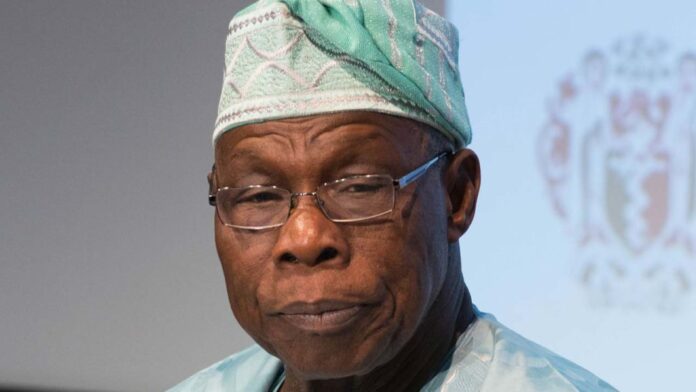Former President Olusegun Obasanjo’s unexpected visit to Senator Oluremi Tinubu, the First Lady, has ignited a fiery debate among Nigerians.
The timing of Obasanjo’s visit, just one day after the Eid el-Kabir festivities, and his public display of wearing a cap adorned with President Bola Ahmed Tinubu’s emblem, has raised suspicions about the underlying motives behind the meeting.
Speculation is rife that this rendezvous may have political implications, particularly with the upcoming 2027 elections.
The historic feud between President Tinubu and Obasanjo since the inception of the Fourth Republic adds to the intrigue and uncertainty surrounding this encounter.
The ramifications of this meeting are expected to reverberate throughout the country for months, if not years, to come.
The news of this meeting was initially shared on social media by Busola Kukoyi, the media aide to the First Lady. Kukoyi stated that Obasanjo paid a courtesy visit to Senator Tinubu to extend his felicitations for the Sallah celebrations.

While the exact location of the meeting was not disclosed in the statement, conflicting reports emerged suggesting that it took place either in the Presidential Villa in Abuja or in Lagos. Subsequently, it was confirmed that the meeting did occur in Lagos.
However, controversy surrounding the meeting deepened when it was revealed that President Obasanjo and the First Lady coincidentally found themselves at different events in the Eko Hotel, Lagos. Mrs. Tinubu promptly seized the opportunity to pay a courtesy call to Obasanjo.
It is worth noting that Obasanjo openly supported the presidential candidate of the Labour Party, Peter Obi, in the 2023 elections.
Furthermore, he did not extend congratulations to President Tinubu upon his inauguration, nor did he attend the ceremony. There have been no previous indications of a meeting between Obasanjo and Tinubu since the inauguration.
In what appears to be a tit-for-tat exchange, President Tinubu refrained from formally congratulating Obasanjo on his birthday last March.
Some perceive Tinubu’s decision to revert to the 1960 National Anthem as a response to Obasanjo’s earlier replacement of ‘Nigeria, We Hail Thee’ with ‘Arise, o compatriots’ during his time as military head of state.
The recent developments have led to mockery from individuals such as Daniel Bwala, the former spokesman for the Atiku Abubakar Campaign Organisation, and Reno Omokri, who have both transitioned to Tinubu’s camp. They have used Obasanjo’s perceived shift in stance to ridicule Peter Obi.
However, media and public commentator Emmanuel Aziken dismisses the notion that Obasanjo’s actions indicate a change of heart in supporting Tinubu for the 2027 presidency.
Aziken argues that such characterizations diminish the legacy of President Obasanjo, one of the most patriotic leaders of the Fourth Republic.
He emphasizes that Obasanjo prioritized competence and a national approach in his appointments, even within his inner circle. Reducing him to an ethnic champion undermines the dignified status that Obasanjo has earned over the years.
Aziken also finds it distasteful that some individuals, disappointed with the interaction between Obasanjo and Mrs. Tinubu, resorted to insolence. He highlights that this not only insults Obasanjo but also disrespects Mrs. Tinubu, known for her respectful manners towards her seniors.
In conclusion, the unexpected reunion between Obasanjo and Senator Tinubu has set off a political storm, fueling speculation and debate across Nigeria. The true intentions behind the meeting remain shrouded in mystery, leaving the nation in anticipation of what the future holds.




